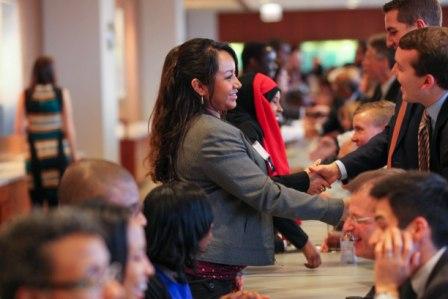Jessica Besser-Rosenberg and Jiffy Lansing recently presented at the Scaling Up Pathways to Results conference on the importance of soft skills and Jessica submitted this post as a review of their talk.
While public-private partnerships are making significant progress in addressing Illinois’ technical skills gap, we can’t ignore the other skills gap frequently cited by a growing number of employers: the soft skills gap. Soft skills include critical thinking, problem solving, communication, collaboration, creativity, initiative, self-direction, social and cross-cultural skills, productivity, and accountability, and there is growing concern that employees are entering the workforce without these skills. This deficit is more prominent among low-income, first-generation minority students who can lack access to the social capital that helps support the development of soft skills. While technical skills are a critical minimum requirement for performing a job, it is ultimately soft skills that make for a successful employee. It is these skills that can help employees become upwardly mobile in their careers over the long term. It is also soft skills that are often the hardest to develop.
One Million Degrees (OMD), a nonprofit committed to empowering low-income, highly motivated community college students to succeed in school, in work, and in life, provides academic, professional, personal, and financial supports to help students excel in community college and beyond. Much of our programming is focused on soft-skills development, emphasizing professionalism and executive functioning skills. OMD program participants maintain a 70% graduation rate at community college (over three times the Illinois average) and are entering the workforce in high-demand fields and/or transferring to 4-year colleges and universities around the state.
Photo: One Million Degrees scholars meet with volunteer coaches during their annual Mocktail event at Chase Tower in Chicago, Thursday, March 20, 2014. (Photo by J.Geil/Chicago PhotoPress)
Through ongoing program evaluation, we see growth in soft-skills among our scholars. However, our evaluation has also shed light on the fact that increased professionalism and executive functioning is not occurring in isolation. OMD Scholars are reporting that their future aspirations have positively changed, their confidence in their abilities to succeed in school and in work has improved, and their academic and professional goals have become more specific and linked to action steps.
What is occurring? We believe that OMD programming may also support positive identity development among low-income community college students, and that this is a key component of success in college, in work, and in life. Why? Failure to establish an adult identity has dire consequences, including the financial distress of an insecure income due to lack of work experience or underemployment, increased levels of anxiety and depression, and difficulty making decisions. Positive identity development is especially important for the economically disadvantaged and minority youth who face significant obstacles to securing stable and meaningful employment due to discrimination and other structural factors.
OMD is working with Jiffy Lansing, PhD candidate in human development and social policy at Northwestern University, to examine how the OMD program supports identity development and how this may impact college and career success. Using an identity framework inspired by and adapted from McAdam’s & Zapata-Geitl’s “Three Strands of Identity Development Across the Human Life Course: Reading Erikson in Full,”1 Jiffy is studying how OMD programming supports the development of the “actor,” which relates to self-presentation, communication skills, and technical skills; “the agent,” which relates to motivation, planning, and decision-making; and “the author,” which relates to integrating one’s perceived past and possible future, and frames transitions within the context of one’s life story.
We are asking: How might doing “identity work” influence how community college support programs operate? How might identity development influence participant outcomes? Is this work relevant in fostering successful transitions through college and into careers?
- 1. McAdams, P. Dan, Zapata-Gietl, Claudia.Three Strands of Identity Development Across the Human Life Course: Reading Erik Erikson in Full. Northwestern University. For K. C. McLean and M. Syed (Eds.), The Oxford Handbook of Identity Development
Jessica Besser-Rosenberg is the director of research and communications at One Million Degrees in Chicago.
